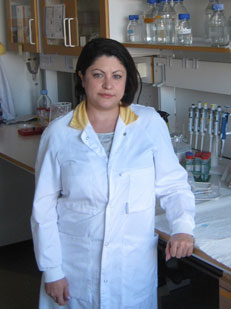Diabetes medication can reduce food intake

Rozita Anderberg, Researcher at Sahlgrenska Academy University of Gothenburg
Obesity and overweight have become a major global problem and can increase the risk of developing cardiovascular diseases and type-2 diabetes, among other problems.
Some high-calorie food can affect the brain in the same way as addictive substances like drugs and alcohol. When we eat, a feeling of well-being is created through the release of dopamine in the brain’s reward center. Overconsumption is considered to be due in part to an imbalance in this system and there is great need for effective new medicines to combat overweight.
Decrease in appetite
Recently, type-2 diabetes has begun to be treated with medications that resemble the body’s own hormone GLP-1, such as Byetta and Victoza. The hormone GLP-1 is produced naturally, both in the intestines and in the brain. After every meal, the levels of GLP-1 in the blood increase, which lead to an increase in insulin production and a decrease in appetite.
Reduce alcohol intake
A new study on rats at Sahlgrenska Academy at the University of Gothenburg shows that hormone-like medication used for type-2 diabetes can affect the brain’s reward system and reduce the need for food intake.
A follow-up study showed that this substance can also reduce alcohol intake.
“Later, we discovered that the same medication can stimulate production of interleukin 6 and interleukin 1, two important hormones that play a major role in our immune system, in the areas of the brain that control appetite. The results are increasing our understanding of how these medications can affect the brain,” says Rozita Anderberg, Researcher at Sahlgrenska Academy.
Potential new treatment
Medications resembling GLP-1 have become a potential new treatment for obesity and these findings can be of major clinical significance.
“Our data can make an important contribution to the understanding of these mechanisms,” says Rozita Anderberg, Researcher at Sahlgrenska Academy.
For additional information, feel free to contact:
Rozita Anderberg, Researcher at Sahlgrenska Academy
+46 761 64 76 66
rozita.anderberg@neuro.gu.se
http://sahlgrenska.gu.se/english/research/news-article//diabetes-medication-can-…
Media Contact
All latest news from the category: Health and Medicine
This subject area encompasses research and studies in the field of human medicine.
Among the wide-ranging list of topics covered here are anesthesiology, anatomy, surgery, human genetics, hygiene and environmental medicine, internal medicine, neurology, pharmacology, physiology, urology and dental medicine.
Newest articles

Silicon Carbide Innovation Alliance to drive industrial-scale semiconductor work
Known for its ability to withstand extreme environments and high voltages, silicon carbide (SiC) is a semiconducting material made up of silicon and carbon atoms arranged into crystals that is…

New SPECT/CT technique shows impressive biomarker identification
…offers increased access for prostate cancer patients. A novel SPECT/CT acquisition method can accurately detect radiopharmaceutical biodistribution in a convenient manner for prostate cancer patients, opening the door for more…

How 3D printers can give robots a soft touch
Soft skin coverings and touch sensors have emerged as a promising feature for robots that are both safer and more intuitive for human interaction, but they are expensive and difficult…





















